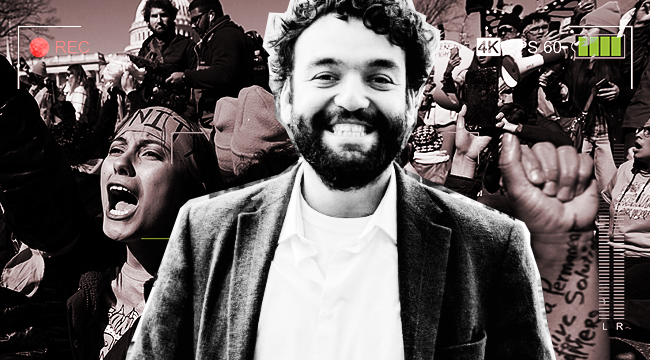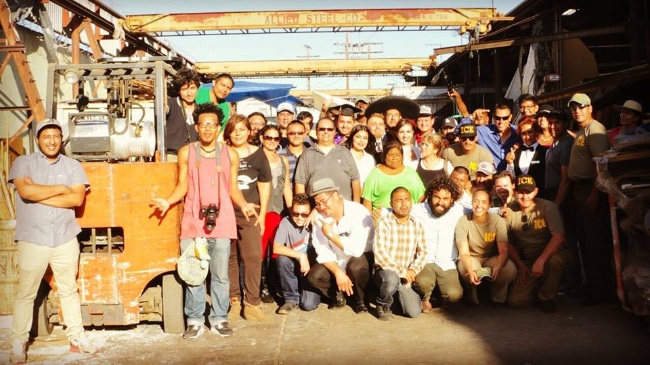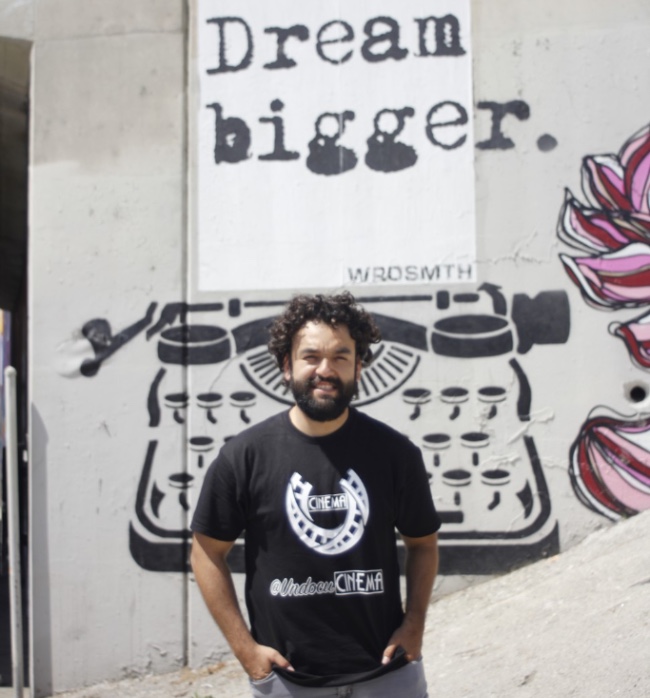
Even though he’s a Mexican citizen, the first time Carlos Alberto Méndez set foot in Mexico since being a toddler was when he was already an adult, attending college in California. Carlos is a DACA recipient, raised almost entirely in the states, and so it wasn’t until President Obama created the DACA program (for young, undocumented immigrants who were brought to the United States as children to connect with their homelands), that he could even consider the risk of international travel.
DACA meant that, for the first time, Carlos could go meet his extended family. His college put together an inaugural trip for he and 13 other dreamers to go to Mexico on spring break — after which they would be allowed back into the U.S. under advance parole. For Carlos and the other students it was an amazing opportunity, but because it was unprecedented, they didn’t quite know what to expect.
“We wanted to have the experience. We wanted to learn about where we came from. We wanted to see our culture, our story,” Méndez, now 28, says. “We had the school and we had the backup and we had the permit and everything. But at first, everybody was scared.”
Still, he took the risk to travel to meet a family that he could barely even remember. This proved bittersweet. Because while DACA allowed him the opportunity to spend time with his relatives, his parents weren’t allowed to be there.
“It was beautiful,” he says, “but you want your mom and your dad to also be there with you. It was tough because you’re carrying the baggage of your parents, the pain and all the tears. I saw the call when my dad heard that my grandpa had passed away. You’re carrying all that with you.”

Méndez has lived in the United States since 1993 — brought from Mexico when he was only three. Life as an undocumented immigrant wasn’t easy.
“My dad constantly works, every day. My mom works,” he says. “We all have to work and everybody has to rely on themselves.”
Things many citizens take for granted like getting financial aid or a scholarship to college is tough when you’re undocumented. Méndez had to find all sorts of creative ways to pay his way. He sold refreshments in downtown LA, eventually opening up a little store. And then there was the challenge of his major. Many artists have to deal with parents who are worried that their kids won’t be able to make a living in such a difficult and unpredictable field. But for the child of parents who gave up so much to give him a successful life in the states, it was even more of a challenge.
“There’s this pressure,” he says. “That you have to do everything that you can to fulfill their hard work, their sacrifice, to make them happy. To represent your people. It’s all this pressure that you have to put on yourself and then you have other things, like the political climate, also over you.”
At first, Carlos tried to avoid art, studying engineering instead. But he couldn’t find any passion in it. Then, he heard about a campus movie festival.
“They give you a camera, and they give you a computer with all the software to edit for one week, and you have to come up with something,” he says. “It was my first semester so I didn’t have anybody there to support me or make a crew or anything. It was really tough.”
He did his best, making a short documentary called, “The Cart” about people living in the street with their entire lives in a single shopping cart.
It won the festival’s grand prize. Carlos remembers that moment fondly. It confirmed that he might be able to follow a different path, not only for him, but for his parents.
“I was so amazed and overwhelmed and I had nobody there so I was just hugging people in the theater. It was crazy,” he says. “I was really hyped up. That was the biggest thing — telling my parents this is what happened. Me in tears on the phone and everything.”

Méndez continued pursuing film, graduating college in 2016, during the last presidential campaign. Being an undocumented Mexican immigrant, it was a constant struggle to watch what was happening.
“I couldn’t wake up in the morning and turn on the TV without hearing a commercial of Trump’s campaign saying, ‘we’re gonna build this wall and these people are criminals and rapists,’” he says. “It was very overwhelming. I thought I can’t vote. but I can put my voice and my message out.”
So Méndez created a film to show what he felt would happen if Trump was elected. It was a worst-case scenario, almost a far-flung dystopia to him— called, “La Pared Human, The Human Wall,” it showed families deported and DACA being rescinded leading to DACA recipients working on the street, their families gone.
“All those things that I did in that little short film have become a reality,” he says. “It scares me. It scares me that this did happen. We’re still living in it, and people are telling us out of anger to go back to our country.” He pauses. “All these things have become visible now. And that’s, I guess, the only good thing because it was always there. This sort of hatred and racism was always under the rug and now it’s very visible. No one gets to be a hypocrite and say, ‘Oh no, we’re not racist.'”
It’s that visibility, exposing what’s under the surface, that is part of the reason Carlos makes short films and documentaries. With the hatred in the new cycle and the terrible things being said about his friends and family by the president, he wants to be seen.
“Sometimes we can feel like we’re just in the shadows,” he says. “Sometimes it feels like nobody’s there cheering for us. I know that there are a lot of people who have so much talent but they don’t have that opportunity. They don’t have that social security number. It’s because of those limitations that sometimes their voices are silent.”
Méndez has struggled at times to get his own voice heard as a filmmaker. That platform isn’t always available for him or the types of stories he wants to tell. And as he started out, he realized so many other young, undocumented people needed to tell their stories too, but they just weren’t getting the opportunity or resources.
“It’s very tough for anybody who’s in this situation and especially in this career,” he says. “As a creator and undocumented, it was really hard to find scholarships or resources in school. Then coming out of school was even harder.”
As a response to this, Carlos and two friends, Lidieth Arevalo and Javier Hernandez, decided last year to create a group to support other DACA recipients in pursuing filmmaking. Calling it UndocuCinema, they hope to provide money and scholarships for education. And as a way to connect Latinx editors, directors, and actors to one another — to create a space of support. They hope soon to start a festival specifically to highlight undocumented voices.
“If we can have a little platform where they can show the world that they’re capable of doing whatever it is that they want to do, then it’s all worth it,” Méndez says. “I have gotten kids who are in high school, who are undocumented and have reached out to me thanking me for showing them this is possible. I’m like, /No. Thank you, guys. Keep on creating. It doesn’t matter if you don’t have your papers. As long as you have your imagination everything’s gonna be okay and you can push forward with what you have.'”
Going forward, the group has several projects in the works. Méndez is working on his first fast motion short, his comment on kids being separated by their parents at the border, butterflies put in cages, alone, unable to fly. Hernandez is creating a short series of documentaries of DACA recipients telling their stories, and Arevalo is profiling undocumented theater performer in a film.
“Everybody is doing something different but it’s always under that cause,” he says. “Always under that message that we have to continue to push forward.”
And as the threat of DACA being taken for good looms above the trio, the idea of being forced out of the only home they’ve known, where their friends and careers are, leaves the young filmmakers sure that empowering young Latinx creatives to make their art is more important than ever.
“Your creative mind, your creative ideas,” Méndez says,“they can’t take that away from you.”
Still, he has to face the possibility that he will have to leave the US and it’s complicated. On that trip to Mexico, (a program which by the way is no longer allowed for dreamers under current immigration policies), Méndez loved his home nation.
“I fell in love with my people. I fell in love with my culture. I fell in love with everything that was over there,” he says. “I was immersed and I felt very welcome.”
But not everyone in his program felt that way. Some of his friends were struck by how they couldn’t even communicate effectively. They spoke Spanish, but they were pegged as outsiders, and they realized that they didn’t belong in Mexico.
“People would be like ‘Oh, you’re not from here. Where are you from?’” Méndez says.“’You don’t belong here.’ I’m like what do you mean, I don’t belong here? I’m speaking Spanish. But they’re like no ..”
It’s heartbreaking for Carlos and many other dreamers to feel like they don’t belong in Mexico but also, told they aren’t wanted here. It’s why he feels what he’s doing — raising up young, immigrant voices — is so crucial.
“We are contributing to this country in every way possible,” he says. “And there’s so much talent here in our community. It needs to be very visible. We have to be outspoken — let our voices out and be heard. It’s showing your activism through your art.”






